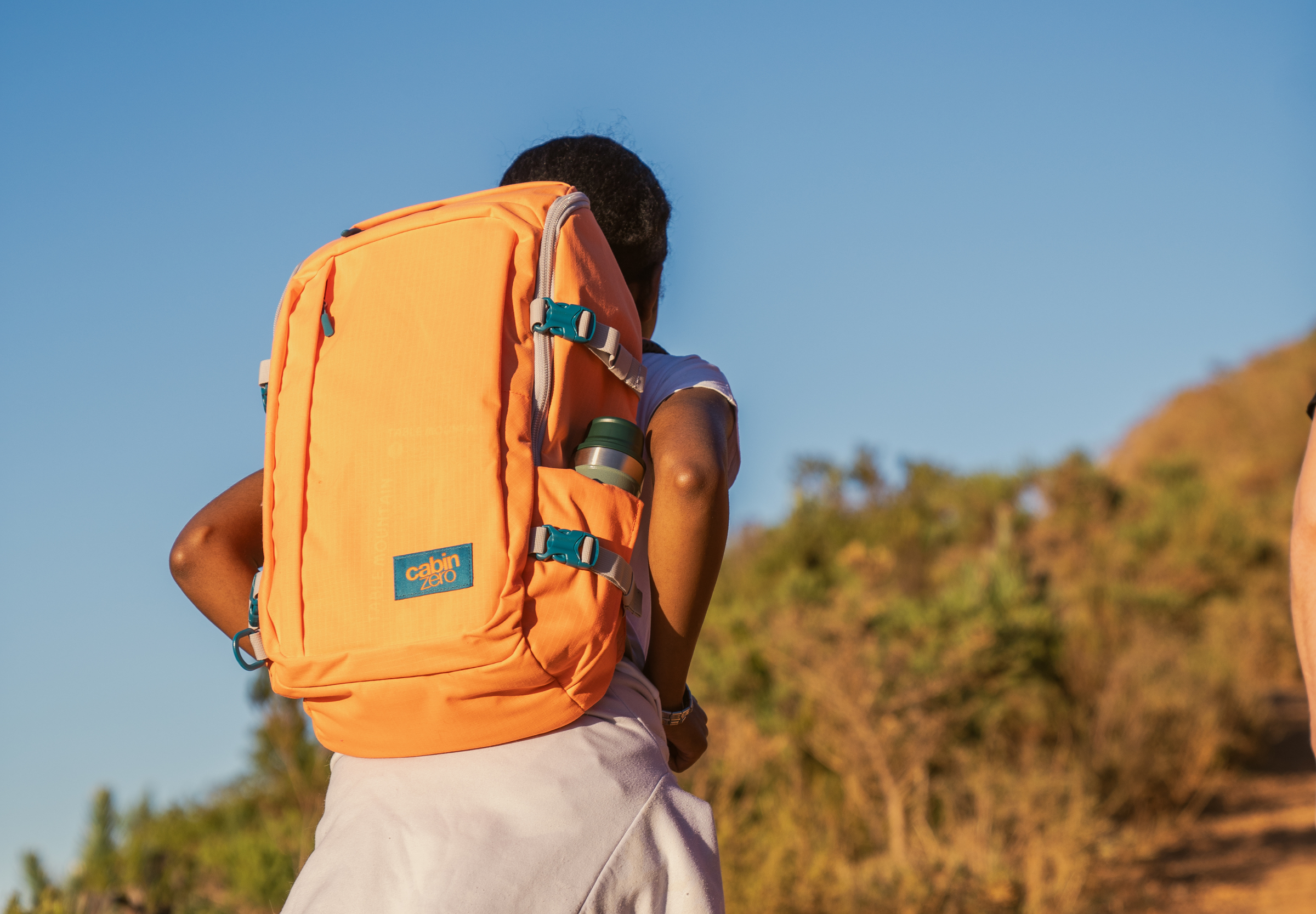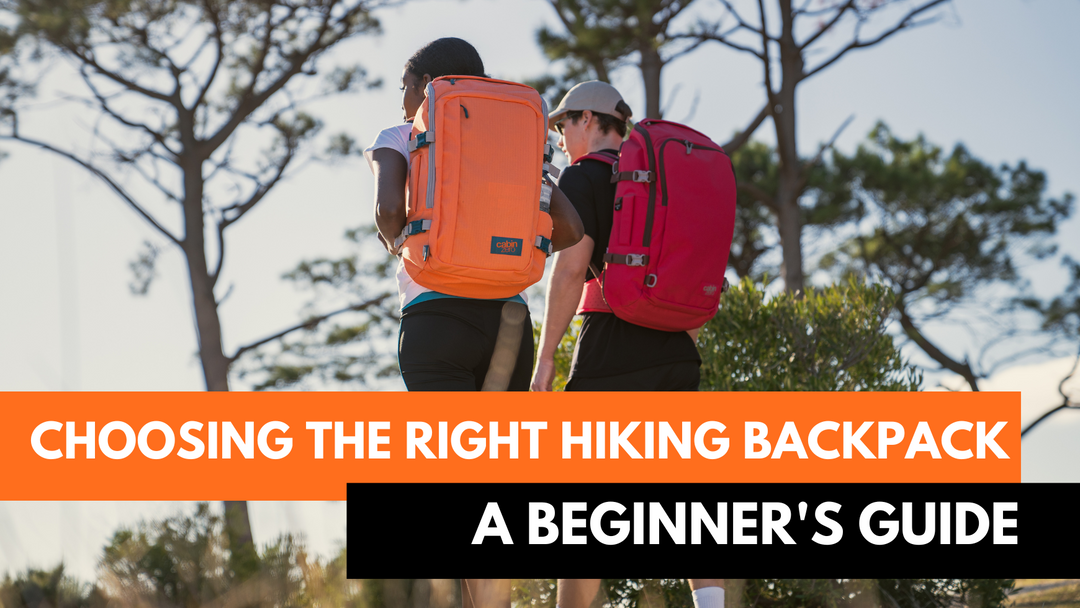
Mochilas De Montaña
Esta colección cuenta con CabinZero mochilas mejores mochila excursions que son ideales para los habitantes urbanos de la ciudad y apoyan sus aventuras diarias. Cuando salgas por la ciudad, estas mochila de montaña te permitirán desplazarte sin problemas, incluso en bicicleta o en transporte público.
Daybags, or daypacks, are the perfect solution for short trips or weekend gateways. They also make for a great small hiking backpack. But did you know there’s more to these small champs? Read on to find out what is so special about daysacks and why you should get one (or two) yourself.
What Are Daypacks And How To Use Them
Simply put, daypacks are the smaller, more nimble cousins of backpacks. They are designed for carrying your essentials during shorter outings, typically lasting a day (hence the name). You can use them for various purposes.
Day Hikes And Outdoor Activities
Lugging around a 70L hiking daypack is the last thing you want on a day hike. The CabinZero Military lineups reign supreme for such purposes thanks to their compact yet resilient design. This small hiking backpack consists of military-grade nylon material, adjustable sternum strap & waist belt, air-mesh shoulder straps, and even MOLLE webbing to attach gear - everything you need for a morning trek at a natural park.
A Day At School
Almost any kind of pack can be used as a school bag, but daypacks are an excellent choice thanks to their lightweight and compact nature. The CabinZero Classic, which is available in 20+ colours, are the perfect choice for a productive day at classes or an outing after. If you want a handy water bottle pocket and external laptop sleeve, pick the upgraded Classic Tech.
Short Trips And Weekend Getaways
If you know how you can easily manage a day bag for a 2-3 nights trip. Unless you are an over-packer, daysacks like the CabinZero 28L backpacks can easily hold essentials like clothes, toiletries, snacks, water bottles, and travel documents. Everything will be more manageable, and your back will thank you later.
For Work
The best daypacks for work are straightforward, sturdy, and often include a dedicated laptop compartment. The CabinZero Classic Tech is the popular choice thanks to its separate laptop sleeve. But if you want a luggage pass-through sleeve and the ability to transform your daypack into a suitcase, you can’t go wrong with the ADV 42L or ADV Pro 42L.
What Is The Best Size For A Daypack?
As mentioned, a day bag is the hobbit in the backpack world. Their volume should be around 15-35 litres. Anything smaller than that will be considered mini packs/bum bags and may not be enough to bring what you need for a day out. Here’s our guide to picking the ideal size for your daypack:
- Short Hikes and Day Trips (15L - 25L): Commuting and Daily Use (20L - 30L): Perfect for carrying laptops, notebooks, lunch, and other work or school essentials. Offers enough space for work or school, running errands, and day trips to museums or libraries.
- Extended Hikes and Outdoor Activities (25L - 35L): Accommodates additional gear like extra clothing, maps, and first-aid kits. Suitable for longer hikes, bike rides, or day trips with more activities planned.
- Travel and Overnight Trips (30L - 35L): Can be used as carry-on luggage for weekend trips to nearby cities, flights, and overnight camping trips. Holds a change of clothes, toiletries, and travel essentials.
Cabinzero Packs - Your Ideal Day Bags
Designed with a keen understanding of the daily commuter and the spontaneous traveller, each CabinZero day bag is crafted to offer maximum comfort, space, and manoeuvrability.
Lightweight & Cabin-approved
There's nothing worse than lugging around a heavy suitcase and paying the excess fees. We all have experienced it firsthand. Thus, we make our collections feature light (the Classic weighs approx. 760g) and are perfectly sized for the majority of airlines. CabinZero backpacks are light and a joy to travel with!
Pack Like A Suitcase
Unlike traditional backpacks, all CabinZero day bags feature a clamshell opening, letting you quickly grab what you need or put last-minute items on the go. Coupled with compression straps, the pack ensures a snug and space-saving fit for your journey.
Lockable Sliders & Okoban Tracing Tag
Security is important when travelling; even if it’s a safe country, there’s still the risk of scamming and snatching. Keeping your belongings safe should never feel like an adventure in itself. Rest easy knowing your zippers are secured with TSA-approved combination locks and an Okoban tracking system.
Laptop Sleeves
If you can’t fly without your laptop, we have good news: our daysacks come with a laptop sleeve in the internal compartment. These separate sleeves are designed to fit most laptops up to 15.6 or 17 inches. The Classic Tech specifically has an external laptop pocket for quick access so you can stay productive whenever you are.
Water Bottle Pocket
Staying hydrated is important, especially when you are under the tropical sun. That’s why we have included the much-needed water bottle pocket on almost every CabinZero pack (Classic and ADV Dry excluded). No more rummaging through your bag to have a sip every now and then.
Preguntas frecuentes
Aunque comparten algunas similitudes, ambos tienen su propia cuota de características y propósitos únicos, suficientes para situarlos en categorías diferentes.
Esencialmente, las mochilas pueden funcionar como bolsas de día si son lo suficientemente pequeñas. Pero no se puede decir lo mismo a la inversa, ya que tendrían que ser más grandes y resistentes, y no lo son.
- Pequeña y ligera (15L-35L)
- Diseño sencillo, pocos compartimentos
- Adecuada para viajes cortos, actividades diarias
Mochila
- Grande y puede ser más pesada (20L-70L+)
- Diseño más complejo con múltiples compartimentos, correas y puntos de sujeción
- Fabricada pensando en viajes largos y cargas pesadas.
Una bolsa de día, también conocida como
La otra cara de la moneda es que es poco probable que sean una buena elección para actividades especializadas como escalada técnica, acampada o mochilería de alta resistencia.
La respuesta es diferente según las necesidades y deseos de cada persona. Por lo general, la mayoría puede viajar cómodamente durante dos días con mochilas de 30 litros. Este tamaño es ideal para llevar lo esencial necesario para un par de días, como una muda de ropa, artículos básicos de aseo, un botiquín de primeros auxilios y un pequeño ordenador portátil o tableta. Es un tamaño popular para los desplazamientos urbanos o los viajes cortos al aire libre en los que no se necesita un equipo voluminoso.
Si quieres ir de excursión y hacer algo de mochila, te recomendamos optar por el volumen mayor de 30-40L. Además de lo esencial, puedes llevar ropa extra, una tienda pequeña o equipo adicional.
Por otro lado, si viajas a algún lugar con un clima cálido, puedes llevar una mochila de 18-20 litros. Pero hay que saber muy bien lo que se hace y es posible que haya que lavar la ropa.
En una bolsa de día se suele llevar lo esencial para las actividades de un día. Hacer la maleta de un día depende en gran medida de lo que tengas pensado hacer, pero aquí tienes una guía general para empezar. Esto es sólo un punto de partida. Adapte su lista de equipaje a la actividad elegida, a la duración y a sus preferencias personales.
- Botella de agua o bolsa de hidratación (2-3 litros para salidas largas).
- Pantalla solar, sombrero, gafas de sol, paraguas
- Mapa, brújula (si es necesario)
- Teléfono (con mapas offline descargados).
- Mapas, guías y billetes
- Botiquín de primeros auxilios
- Comida y tentempiés (lleva alimentos energéticos como frutos secos, barritas, mezcla de frutos secos y sándwiches)
- Lámpara frontal o linterna
- Desinfectante de manos y pañuelos de papel.
Para la mayoría, 30 litros o menos es el número mágico. Ni demasiado pequeño ni demasiado grande, esta capacidad resulta cómoda para muchos, ya que pueden cargar alrededor de 5-6 kg para lograr un equilibrio entre comodidad y velocidad.
Fastpacking con una capacidad de 20L es factible, pero sólo es posible cuando usted ha descubierto qué equipo de viaje funciona mejor para usted. Empieza con rutas locales y con alguien que sepa lo que hace antes de lanzarte a la aventura.






















































































